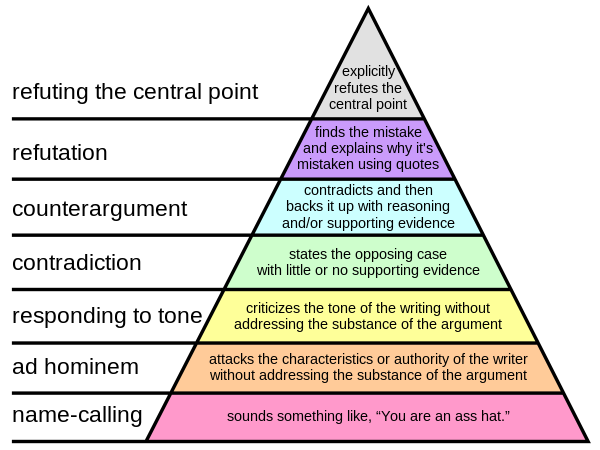How to Disagree
I stumbled across an article by Paul Graham that has some great background for intelligent debate. TL;DR check out the following graphic summary:

I think we all could benefit from referring to this as we post, and striving to push our posts into the top half of that framework.

I think we all could benefit from referring to this as we post, and striving to push our posts into the top half of that framework.
15


Comments
Every time I see someone say "That's a strawman argument" or "This is a logical fallacy", it looks like ad hominem; and when you're on the receiving end of it, it feels like name calling.
Even then it falls down by putting responding to tone as a relatively poor argument, whereas in reality, criticising/responding to tone can be central to refutation, since tone drives the substance.
I respectfully disagree about the "logical fallacy" part of your argument. Pointing out someone logical fallacy it is not necessarily an attack ad hominem.
IMO it depends on how you do it.
If you say something like "This is a logical fallacy, how can you be such an idiot" then you are right. But, if you politely point it out, I see it more like a "Refutation" or even "Refuting the central point" based on how important to the overall argument the fallacy is.
Refutation is, based on the above graphic, "to find the mistake in someone argument" and that exactly what a logical fallacy is, i.e. a mistake in someone argument. That doesn't imply that someone is stupid, but just that he made a mistake in his reasoning. It can happen to anyone
Still I don't see anything wrong with it, if you do it in a polite non-patronising way.
You just need to disagree without resorting to personal insults or attacks.
I say this, because there have been many times where I'm been in a debate/argument, and I simply cannot get across what I am feeling and thinking, and it's frustrating to point of making you feel sick.
Never was a word uttered about the point of debate, compromise, understanding eachother's points or reaching a mutual beneficially conclusion. Just who wins.
Looking at politics, it's depressing to see what that kind of thinking gets you.
Since the goal of the debate is to win, many people will resort to ad hominem or name calling, usually because they have no valid counterarguments or strong refutations to offer. Dialogues, on the other hand, obviate the need for personal attacks, since one (hopefully) enters into the dialogue with the intention of transcending barriers instead of fortifying them.
Now abstaining from personalizing the discussion or resorting to personal attacks doesn't mean that one has to agree with or even have respect for the other party's ideas. In fact, as Salman Rushdie learned as a Cambridge student, once a set of ideas is protected from criticism, free thought becomes impossible. In the end, what's more important: protecting those from possibly being offended or building an environment that fosters open and honest dialogue? I don't see a middle ground there.
That said, the last thing I posted on was a "Swashbuckler vs. F/T" thread, and hence am a complete and admitted hypocrite. Meh, C'est la Internet.
As seen below from a debate I once had.
(Diffused due to rules on reposting)
I generally aim for the top three items. Typically, when I disagree with something, I disagree in
styledetail. I've even hit the BioWare Social Networks' ~11,000 character limit and needed to use two posts to reply in such a way that it wasn't disjointed.I'm tempted to see if this forum has a character limit (I'm joking)...
It does happen a lot in the British Press, as evidenced today:
http://www.theguardian.com/media/2013/oct/01/daily-mail-refuses-apologise-ralph-miliband